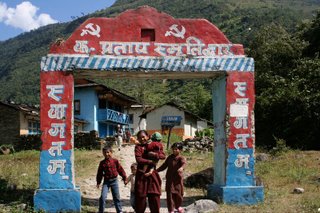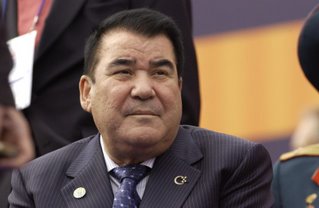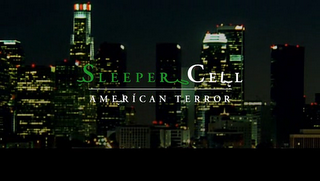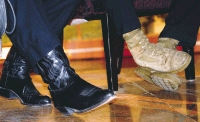Right now, the most popular troop transport vehicle for soldiers on patrol in Iraq is the High Mobility Multipurpose Wheeled Vehicle, developed in the 80's by a still-functional arm of the now-defunct American Motors Corporation. This division was sold when AMC was wholly acquired by the French car company Renault. The HMMWV is still assembled by AM General in their only assembly plant, in Mishawaka, Indiana. The overwrought civilian counterpart of the HMMWV, the Hummer, was part of the Jeep-Eagle line sold to Chrysler and brought home to plague the narrow streets and parking spaces of our nation. The HMMWV's first use was in the Panama conflict of 1989, known as Operation Just Cause.
Like its predecessor, the WWII-era Jeep, the HMMWV was designed for personnel and light cargo transport behind the front lines, where it would need no armor or protection from NBC (nuclear-biological-chemical) threats. Basically, it was designed for UN peacekeeping-type missions, which by all accounts, it did capably in Somalia with its lightness and agility. It was not designed with the vagaries of low intensity conflicts or asymmetric warfare which embroil soldiers in Iraq today, offering little protection against sustained small arms fire, to say nothing about heavy arms like machine guns, anti-tank mines or rocket-propelled grenades. Although armor upgrade kits are available, these were not provided at the outset of the Iraq conflict, spurring the rapid evolution of the most-dreaded weapon in this war, the improvised explosive device (IED), a homebrew concoction which can take the appearance of a variety of otherwise mundane items. There is a new book out for military leaving for Iraq which records advice for servicemembers to help them survive their first 100 days. About half of this book concerns the threat of IEDs. As Congressman Marty Meehan of the House Armed Services Committee (D-MA) described it, the shortage of armored vehicles is "
a dangerously exposed center of gravity" of America's military presence in Iraq, and the lack of preparedness for insurgent tactics such as deploying IEDs were "
symptomatic of a headlong rush to war."

As a result of this confluence of deficiencies, American soldiers and Marines stationed in Iraq have taken it upon themselves to improvise additional armor layers for their HMMWVs from scrap metal and other materials, known colloquially as '
hillbilly armor'. This follows a long history of improvised protection by American armed forces, such as WWII tank crews welding spare strips of tank track to the hulls of their tanks and Vietnam-era trucks reinforced with sandbags. Some officers were even disciplined over their refusal to carry out missions in vehicles they considered to be improperly armored. While reassuring to soldiers stuck policing an intercenine civil conflict with vulnerable unarmored transportation, hillbilly armor has several unintended consequences which make it more dangerous to passengers: the added weight makes vehicles slower and less fuel-efficient, overloading the drivetrain and suspension components; the higher center of gravity and weight increase the propensity towards sway and rollover; and additional shrapnel is created when an IED attack is successful.
The intractably high loss rates of the unarmored HMMWV has caused a great deal of concern, especially the incredible vulnerability to attacks from underneath the vehicle. The US DoD has contracted AM General to make new improved HMMWVs with turbo-charged engine, a windshield with ballistic protection and side/rear armor plates. Already the HMMWV's failure at force protection has boosted the popularity of the eight-wheeled Stryker, whose apt name is actually in tribute to a family of noted veterans. The first new vehicle in the US military developed since the Cold War-era M2 Bradley '
tank-killer' tank, the all-wheel drive Stryker was based on an idea by the lamentably retired General Eric Shinseki and is highly recognizable due to its catcher's mitt-like slat armor, which deflects anti-tank rpgs.

The Stryker has a whole suite of protective measures never contemplated by the HMMWV designers, like automatic fire extinguishers and NBC and radiological air purification and sealing system for the interior. Most of the criticism of the Stryker is that it is both too heavy, making it prone to rollover in the crumbling shoulders of Iraqi and Afghanistani roads and that it is too light in comparison to tracked vehicle like the M2 and less capable on unpaved road. However the superiority in urban settings and against IEDs led to overwhelming testimony in support of its continued use, including its exuberant defense by Colby Buzzell, former Stryker Brigade Combat Team member and milblogger.
A few years back, alerted by the failure of the HMMWV, the US Army has launched a search for its successor, a truly multipurpose vehicle. Candidates include the Ultra Armored Patrol (AP) designed by Georgia Tech's applied research arm, which is built on the skeleton of a Ford F-350 truck and includes NASCAR enhancements like shock-absorbing seats and multipoint safety harnesses and also, in a suggestion from soldiers in the field, sits occupants back to back in a diamond shape within an egg-shaped armor and bulletproof glass 'blast bucket', keeping allowing surveillance in all directions and protecting from exploding tires. There is also the Military Xtreme Truck (MXT) by International Trucks, based on their limited-edition Commercial Extreme Truck, the largest pickup truck currently in production, capable of towing 20 tons and costing $115, 000 dollars to start. At 7-10 miles per gallon, the CXT prompted Daniel Becker, director of the Sierra Club's global warming and energy program to say: "
Shame on International for making this thing...This is a monster truck that only a Hummer could love, and it shows that without government leadership, the auto industry will lead us to more irresponsible, gas-guzzling vehicles." The most buzz-worthy entry, however, is the RST Shadow. Within its lightweight aluminum body is a hybrid diesel/electric motor which enables a silent electric mode. Basically, a Prius gone bad-ass. If nothing else, the Shadow would change the perception of hybrids as lacking in power and fortitude.
An MRAP is a
mine-resistant ambush-protected vehicle. They are designed with a v-shaped single-shell body which assists in the deflection of mines and IEDs, increasing the survivability when on patrol 'outside the wire.' Billions are needed to fund the MRAP program, a significant cost but one has become politically untenable to refuse due to casualty rates in excess of Vietnam War loss rates. Already the UN uses the MRAP vehicle RG-31 Nyala as the transport of choice to protect its personnel against landmines.

The program to retire the HMMWV and replace it with the MRAP was part of the supplemental appropriation based by Congress last week. What amazes me is not that Democrats caved to the pressure to send a funding bill for the war without timetables but that they lasted as long as they did on the original bill. There is an awful lot of magical thinking coming from the netroots on this issue, namely the idea that anything less than a veto-proof majority will be able to force George to do anything legislatively that he doesn't want to do. Yes, yes the American people clearly want an end to the occupation of Iraq and Bush is at historically low levels of approval, so this should be a 'slam-dunk' but the reality is more nuanced than this.
First, the Democratic majority in both houses is softer than shit in a sneaker: 15 seats in the House, mostly centrist or conservative Dems who replaced highly conservative Republicans in the last election and in the Senate, not even a real majority if you consider a still-ailing Tim Johnson and secret Republican Joe Lieberman. And who breaks a tie in the Senate? Anyone? Oh yeah, that's the Vice President, the man who just this week mocked the Geneva convention and the idea of Constitutionally protected civil liberties at the graduation ceremony for West Point.

The willingness to automatically convene a circular firing squad over the appropriations debacle can only play into the hands of the GOP. No recognition of the fact we were one pen stroke away from calling an end to this a few weeks ago. Nope, just a wishful understanding of the mechanisms of the US government: that if Bush had no bill giving him money, he would have to withdraw the troops. To be sure, the Democratic leadership was not helped by the media's immediate assumption of this issue being a false choice between 'supporting the troops' and abandoning them in the field without bullets. The problem is that the perfect is the enemy of the good here and too many people expected too much out of their congresscritters.

It also doesn't help that the Democrats are so afraid of being painted with the 'pussy' brush that they act indecisively and then wonder why people think they are wimps. And I don't think many progressives really considered how damaging the phrase 'surrender date' was to public opinion.
But...but...we elected the Democratic majority so that they would end the war, you say, which may be sort of true, but, like our soldiers in their poorly defended HMMWVs, we gave them juuuuuust enough seats to lose this battle. Polls are soft as well especially when unidimensonal, so that a majority of people could believe both that timelines are sorely needed AND that defunding the war would leave soldiers stranded in Samarra and out of gas to get back to base. You should all know W better than that, when he would have just held them hostage anyway. It wasn't going to happen, in the same way that impeachment is not going to just magically happen on the basis of a public opinion poll. There isn't even agreement within the Democrats as to how withdrawal would occur. There might be consensus that we need out of Iraq but there is not yet a majority for the idea of an immediate withdrawal, much less a defunding.
The only way to get a overriding majority for the timetables is to fracture the GOP caucus and have enough of them fear for their political lives cause them to override a veto. Which is to say nothing of childish notion that withdrawal wouldn't cost alot of money in itself and take alot of time. Instead, let's form a third party to draw away just enough votes from the Democrats to have them lose their elections while we mentally wank off about how a purist Green congress would have done things while the Republicans sweep back to power and chortle at the fractiousness of the Dems (
a la Cindy Sheehan) or a primary challenge to anyone and everyone that seeks to do what Kennedy did to Carter in 1980.
Unless there are technical changes in the voting system,
Duverger's law shows that we always be in a two-party system, as votes that would go to a third party would need to be taken from one of the two main parties in order to achieve any critical mass. You won't change that structure by proving it to be true -- by going off into a tiny huddle and saying you're a new party, but only succeeding in siphoning off enough of a handful of votes from the Democrats to give us the next incarnation of George W. Bush. No, they should have stuck to making symbolically meaningless gestures that do nothing (a non-binding withdrawal timeline) and engage in a stubbornness contest with Bush. Because threat worked so well when the GOP tried it with Clinton in 1995. And the result would be the same, Bush shuffling around money while blaming Congress for leaving the troops to starve in the desert. The man thinks he's on a mission from God and folks, he has nothing to left to lose if he gives this up. Not even the sainted Founders could have imagined a chief executive that is this big of an asshole.
Oh, just keep sending him the same timeline-containing bill as before, over and over again until the pressure is so great that he will have to sign it. However, the strategy of 'do nothing and the war will end' is, perversely, also is opposed by a majority the American public. Clearly, stomping their feet, holding their breath and taking their barbie dolls home to play by themselves is not going to fix anything. But the netroots seems so willing to give ownership of the failed war to the Democrats that Karl Rove must be ecstatic at the progressive community's boundless capacity for self-destruction.
Español | Deutsche | Français | Italiano | Português| Ch| Jp| Ko







































